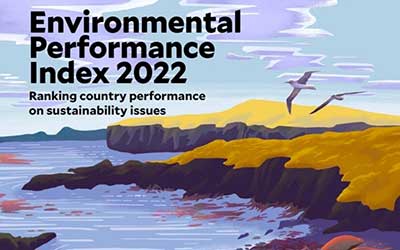Relevance: GS-3: Conservation, environmental pollution and degradation, environmental impact assessment.
Key Phrases: Environment Performance Index 2022, World Economic Forum, Ecosystem vitality, Climate change performance, Environmental health, GHG emission per capita, Common but Differentiated Responsibilities and Respective Capabilities, Waste generation per capita, Sustainable consumption.
Context:
- The Union Environment Ministry has rebutted the Environmental Performance Index 2022, which ranked India at the bottom of a list of 180 countries, saying some of the indicators it used are extrapolated and based on surmises and unscientific methods.
Environmental Performance Index 2022
- The EPI, a biennial index, was started in 2002 as Environmental Sustainability Index by the World Economic Forum in collaboration with the Yale Center for Environmental Law and Policy and the Columbia University Center for International Earth Science Information Network.
- The recently released Environmental Performance Index 2022 evaluated countries on climate change performance, environmental health, and ecosystem vitality using 40 performance indicators across 11 categories.
- Environmental Performance Index 2022 categories are in turn
aggregated into 3 policy objectives:
- Environmental Health
- Ecosystem Vitality
- Climate Change.
- The EPI team transforms the raw environmental data into indicators that place countries on a 0–100 scale from worst to best performance
Key Highlights of Environmental Performance Index 2022:
- Among all, Denmark topped the 2022 in the Environmental Performance Index (EPI), for an achievement rooted in strong performance across nearly all issues tracked by the EPI, with notable leadership in efforts to promote a clean energy future and sustainable agriculture.
- The United Kingdom and Finland place 2nd and 3rd, both earning high scores for slashing greenhouse gas emissions in recent years.
- The United States places 20th out of 22 wealthy democracies in the Global West and 43rd overall.
- With a paltry score of 18.9, India’s 180th ranking comes after Pakistan, Bangladesh, Vietnam and Myanmar. India has scored low on rule of law, control of corruption and government effectiveness.
Environmental Performance Index 2022: India’s score
- India has been given an EPI score of 18.9 EPI on the Environmental Performance Index 2022. The three primary categories under which the scores have been given are ecosystem vitality, climate change performance, and environmental health.
- India has score 19.3 on the ecosystem vitality on the index and the change in the area in the last decade in -2.
- The country has score 12.5 on health, meaning poor air quality, drinking water and sanitation. India’s waste management in terms of ocean plastics, solid wastes and recycling is also poor.
India’s objections on Environmental Performance Index:
- The Environmental Performance Index (EPI) 2022 released recently has many indicators based on unfounded assumptions. Some of these indicators used for assessing performance are extrapolated and based on surmises and unscientific methods.
- A new indicator in the climate policy objective is 'projected GHG emissions levels in 2050'. This is computed based on the average rate of change in emission of the last 10 years instead of modelling that takes into account a longer time period, extent of renewable energy capacity and use, additional carbon sinks, energy efficiency etc. of respective countries.
- Forests and wetlands of the country are crucial carbon sinks but have not been factored in while computing the projected GHG emissions trajectory up to 2050 given by EPI 2022.
- Historical data on the lowest emission trajectory has been ignored in the computation.
- The weight of the indicators in which India performed well has been reduced and the reasons for such change have not been explained in the report. For example, for black carbon growth rate indicator, India's score has improved to 100 in 2022 from 32 in 2020, whereas the overall weight of the indicator is reduced to 0.0038 in 2022 from 0.018 in 2020.
- No indicator talks about renewable energy, energy efficiency and process optimisation. The selection of indicators is biased and incomplete...Per capita GHG emissions contribute only a miniscule 2.6 per cent weight overall in the index.
- The principle of equity is given very low weightage in the form of indicators like GHG emission per capita and GHG Emission intensity trend. The CBDR-RC principle is also barely reflected in the composition of the index.
- Common but Differentiated Responsibilities and Respective Capabilities (CBDR RC) acknowledges the different capabilities and differing responsibilities of individual countries in addressing climate change.
- The indicators on water quality, water use efficiency, waste generation per capita which are closely linked to sustainable consumption and production are not included in the Index.
- The index emphasises on the extent of protected areas rather than the quality of protection that they afford. Management, effectiveness and evaluation of protected areas and eco-sensitive regions is not factored into the computation of biodiversity indices.
- The index computes the extent of ecosystems but not their condition or productivity. It did not include indicators like agro biodiversity, soil health, food loss and waste even though they are important for developing countries with large agrarian populations.
Common but Differentiated Responsibilities and Respective Capabilities
- Common but Differentiated Responsibilities and Respective Capabilities (CBDR–RC) is a principle within the United Nations Framework Convention on Climate Change (UNFCCC) that acknowledges the different capabilities and differing responsibilities of individual countries in addressing climate change.
- The principle of CBDR–RC is enshrined in the 1992 UNFCCC treaty, which was ratified by all participating countries. The text of the convention reads: “… the global nature of climate change calls for the widest possible cooperation by all countries and their participation in an effective and appropriate international response, in accordance with their common but differentiated responsibilities and respective capabilities and their social and economic conditions.”
- CBDR-RC has served as a guiding principle as well as a source of contention in the UN climate negotiations.
Source: The Hindu BL
Mains Question:
Q. Discuss the role of EPI to promote sustainable development in support of a more environmentally secure and equitable future.







